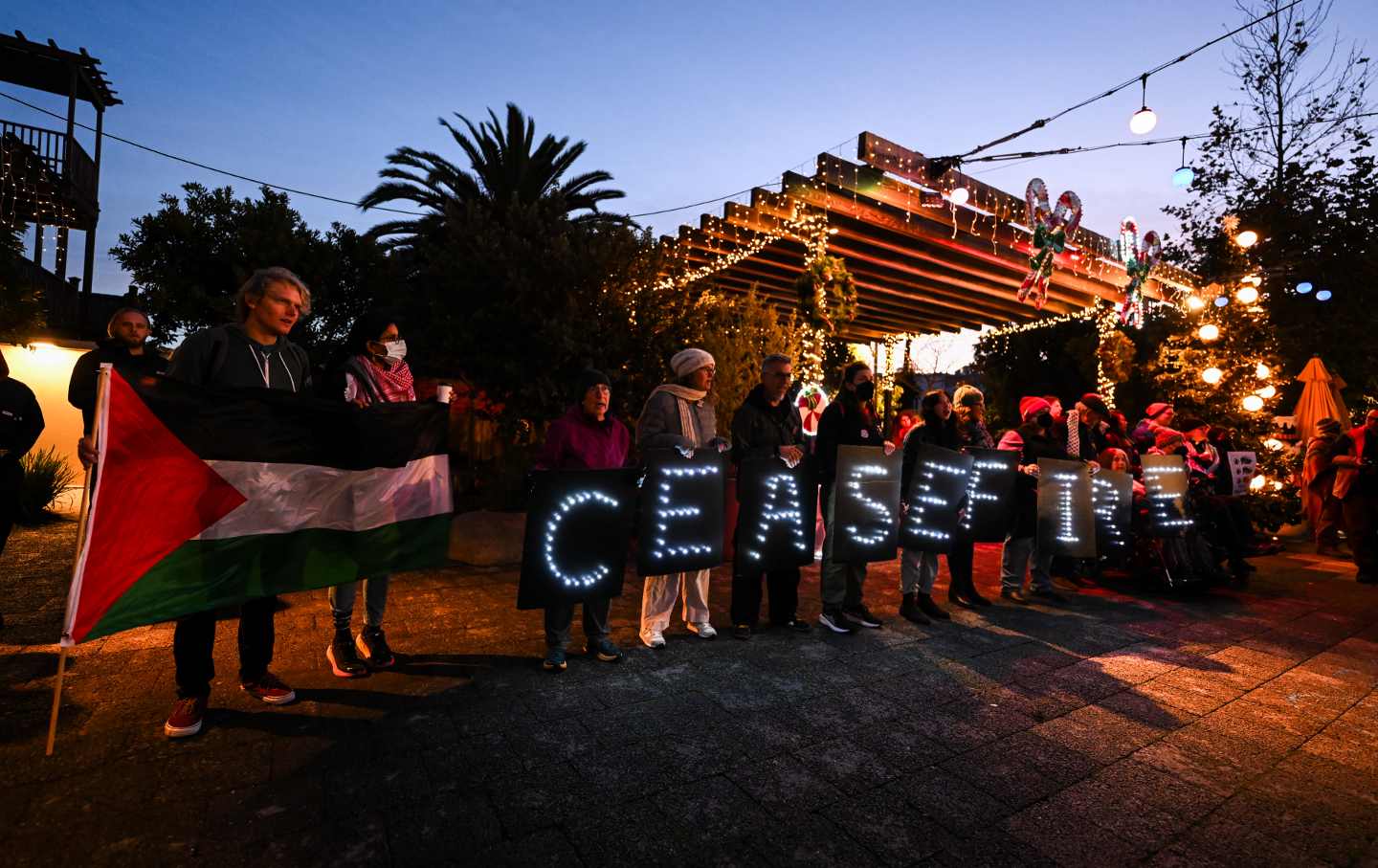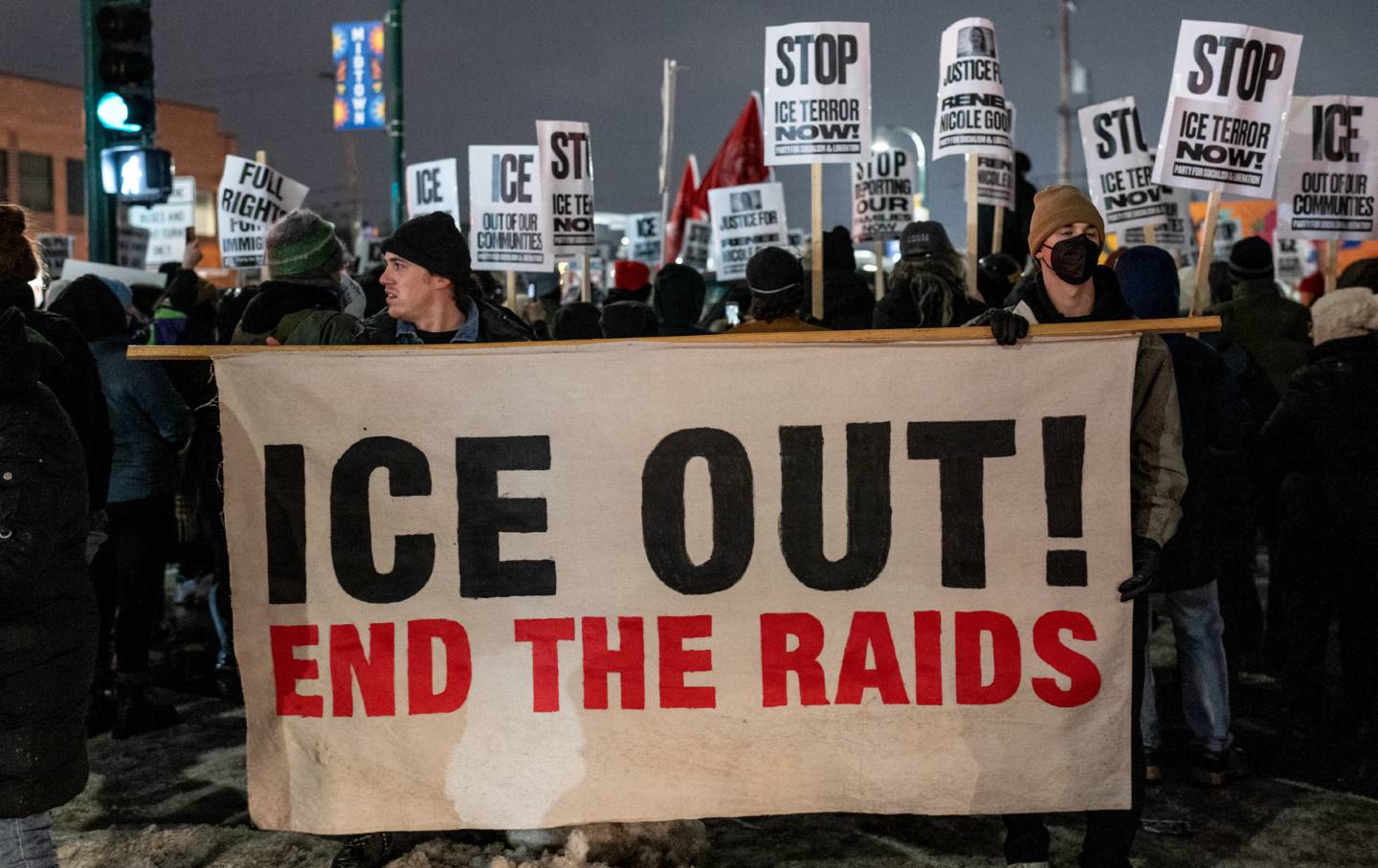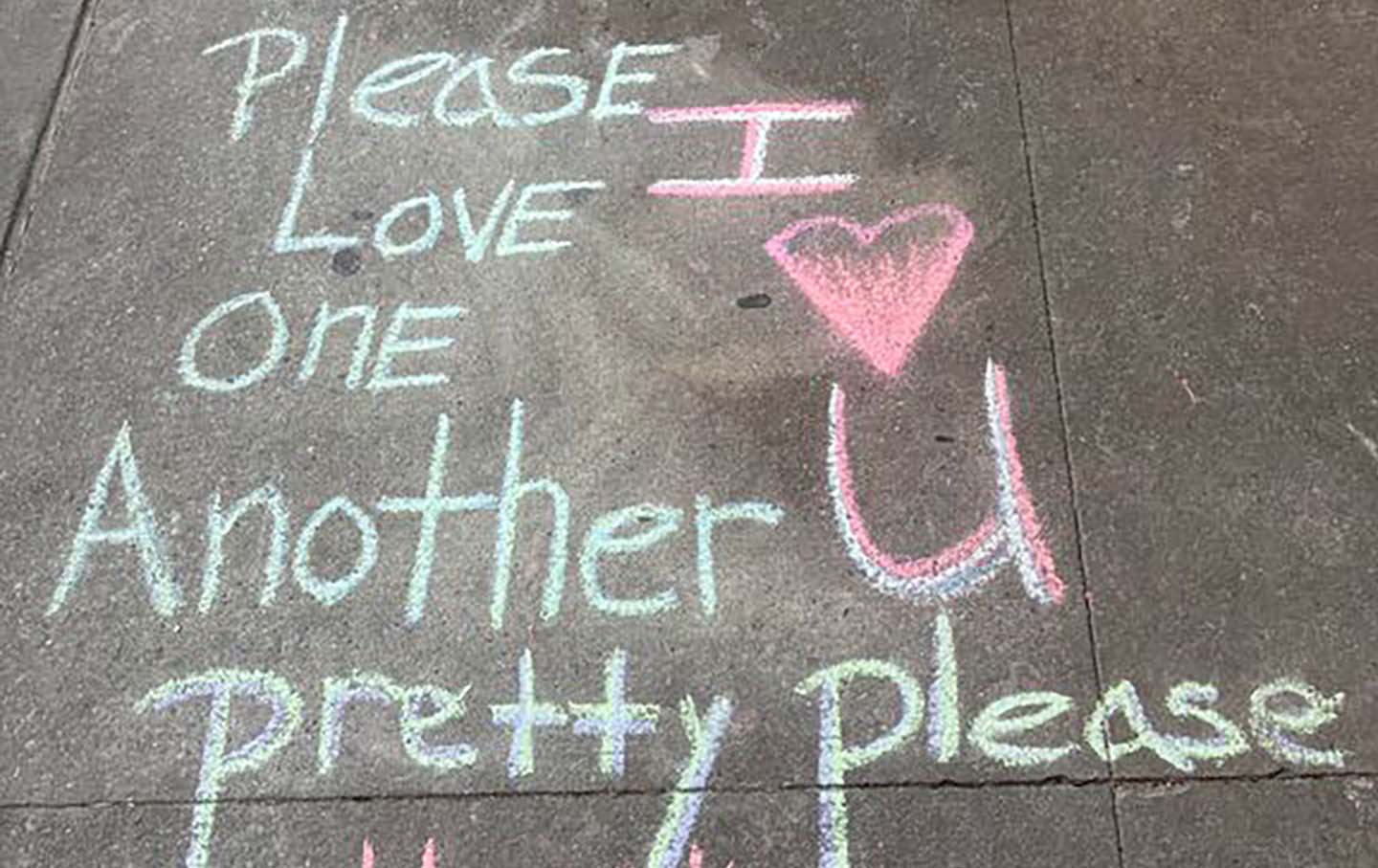Americans Are More Likely to Back Candidates Who Support a Cease-Fire, a New Poll Shows
The survey finds high levels of enthusiasm for a Gaza cease-fire, especially among young voters and key Democratic constituencies.

A rally in support of a Gaza cease-fire in San Francisco on January 6, 2024.
(Tayfun Coskun / Anadolu via Getty Images)Powerful political action committees and dark-money groups that want the United States to continue to support Israeli Prime Minister Benjamin Netanyahu and his government have signaled that they intend to spend epic amounts of campaign funds to defeat progressive House members who support a cease-fire in Gaza. Indeed, there have been reports that the American Israel Public Affairs Committee and its allies could spend as much as $100 million to boost primary challenges to popular incumbent Democrats such as Missouri’s Cori Bush and Michigan’s Rashida Tlaib, the chief sponsors of a cease-fire resolution in the House, along with cosponsors of the proposal to stop the killing, such as Minnesota’s Ilhan Omar and New Yorkers Alexandria Ocasio Cortez and Jamaal Bowman.
But the evidence is clear that Americans are not inclined to punish House members who, since the October 7 Hamas attack on Israel and the ensuing Israeli bombardment and invasion of Gaza, have called for de-escalation. In fact, according to a new nationwide poll, likely voters are substantially more likely to back candidates for Congress if they know those candidates favor de-escalation.
“In responses to two separate questions, by a two-to-one margin, respondents indicated they are more inclined to support a member of Congress who supports a cease-fire and that they are less willing to support members of Congress who oppose calls for a cease-fire,” explains a summary of the findings from the poll of 1,000 Americans, which was commissioned by the American Arab Institute and Rainbow PUSH Coalition and conducted January 4 and 5 by John Zogby Strategies.
The poll was released Friday morning in Chicago, at the opening of a two-day “Emergency Summit on Gaza” that is being held this weekend in Chicago, bringing members of Congress, religious leaders, and peace and human rights groups to the historic Rainbow Push Coalition headquarters on Chicago’s South Side.
Convened by Rainbow Push, AAI, and a coalition of groups—including Churches for Middle East Peace, Faith for Black Lives, the Fellowship for Reconciliation, the U.S. Palestinian Council, If Not Now, the Jewish Voice for Peace Rabbinical Council, the Muslim Civic Coalition, the National Council of Churches, Progressive Democrats for America, Red Letter Christians, and Sojourners—the summit seeks to build support for “an immediate permanent cease-fire in Gaza and the immediate release of all Israeli hostages and Palestinian prisoners held without charges or due process.” (I’ll be moderating a panel at the summit.)
The summit’s conveners want the US government to take the lead in facilitating unimpeded United Nations–supervised humanitarian aid in Gaza, and to ”condition funding to Israel on its adherence to U.S. law just as is required for every other nation that receives U.S. military financing.” And they are, of course, concerned about the threat that the Israel-Palestine conflict could evolve into a wider war in the Middle East—where on Thursday night American-led missile strikes hit targets in Yemen associated with the Houthi militia forces that have vowed to attack commercial shipping in the Red Sea until Israel withdraws from Gaza. The New York Times described the missile strikes as “an expansion of the war in the Middle East that the Biden administration had sought to avoid for the past three months.”
The Rev. Jesse Jackson, the veteran civil rights leader, Operation PUSH founder, and two-time presidential candidate who has long been involved in efforts to promote Middle East peace, and who played a key role in convening the Gaza summit, argues that a cease-fire is essential to the broader goal of achieving peace and justice in the region.
Securing a cease-fire is no easy task, however, especially at a time when the Biden administration continues—with support from most members of Congress—to back Netanyahu, who has said, “The war must not be stopped until we achieve all of [Israel’s] objectives.”
But Friday’s poll, along with several other surveys that have shown a rise in sympathy for a cease-fire and for a reframing of the US relationship with Israel, holds out hope for advocates of a shift in US priorities.
The poll analysis explains:
“Americans are calling into question the Biden Administration’s handling of the conflict. When asked to evaluate Biden Administration policy, 50 percent of Americans believe it favors Israel. But when asked how the Biden Administration should conduct U.S. policy, a plurality of respondents (42 percent) say U.S. policy should be balanced between Israeli and Palestinian needs. By a decisive two-to-one margin, voters say that instead of siding with Israel (a position held by only 26 percent), the U.S. should strive to be an honest broker between Israelis and Palestinians (a position held by 57 percent). This questioning of the Biden Administration’s one-sided support for Israel also has an impact on voters’ attitudes toward U.S. military assistance to that state. By a two-to-one margin (51 percent to 26 percent), voters reject the notion that the U.S. should give unrestricted military assistance to Israel as long as Israel is putting Palestinian civilian lives at risk. By the same two-to-one margin, respondents said that they sided with those Democratic Senators who objected to the President’s recent decision to bypass congressional oversight in sending weapons to Israel. A plurality of voters (41 percent) now indicate that it is time to consider cutting or conditioning Israel’s annual $3.8 billion appropriation for military assistance.”
Arguably, however, the most notable poll numbers are the ones suggesting that support for a cease-fire is politically popular.
Roughly 60 House members have come out for a cease-fire, according to a running tabulation maintained by the group Win Without War, while four senators have done the same. Bush, Tlaib, and their allies have made the case that increasing support for a cease-fire in general—and for their resolution in particular—puts pressure on the president to rethink his approach.
Popular
“swipe left below to view more authors”Swipe →There’s no question that AIPAC and its allies will seek to counter that pressure, with lobbying and threats of political retribution in 2024 Democratic primaries. Representative Ro Khanna, a California Democrat who supports a cease-fire, says he thinks that if the number of Democratic backers of de-escalation rose to 100 or more, it would significantly open up the debate in Congress, where on Tuesday Senator Bernie Sanders (I-Vt.) will try to get the Senate to approve a resolution that would require the Biden administration to produce a report on Israel’s human rights practices.
DC watchers know that AIPAC and its allies will seek to counter pressure for the administration and Congress to take a tougher line on Gaza, with both lobbying and threats of political retribution in 2024 Democratic primaries. But the Rainbow PUSH/American Arab Institute poll suggests that the targeted incumbents are more in tune with the electorate than many pundits and political operatives recognize.
When likely voters were asked if they would be more or less inclined to back a pro-cease-fire House member, 51 percent said they were “more inclined,” while 23 percent said they’d be “less inclined.” The numbers were most dramatic among Democrats, with 61 percent saying they’d be “more inclined” to just 17 percent who indicated they would be less inclined. Among key constituencies for the Democrats, the numbers are similarly striking: 60 percent of all voters aged 18-29 said they would be “more inclined” to back a cease-fire supporter; among non-white voters, the figure was 56 percent.
Even among Republicans, the split was 39-30 toward the “more inclined” position. Among independents, it was 52-22.
“There’s significant support for candidates who support a cease-fire,” says AAI President James Zogby, who in 1984 and 1988 served as deputy campaign manager and senior adviser to Jesse Jackson’s presidential campaigns; he was also appointed by President Obama to the United States Commission on International Religious Freedom, and served on the executive committee of the Democratic National Committee from 2001 to 2017. (James Zogby is the brother of pollster John Zogby, and the two have long experience studying public sentiment regarding issues involving Israel and Palestine.)
Zogby noted that the results from the new poll parallel results from other surveys, “which suggest that President Biden is losing support with young people and non-white voters over Gaza.”
If the poll numbers are concerning for Biden and his team, they’re encouraging for pro-cease-fire House members, such as Texas Democrat Greg Casar. Casar, a cosponsor of the House cease-fire resolution commissioned his own poll in November, asking voters if they would be more or less inclined to back a candidate who backs de-escalation. Seventy-three percent of potential Democratic primary voters surveyed by veteran Democratic pollster Celinda Lake said they’d be more likely to support a pro-cease-fire candidate, with 46 percent saying they’d strongly support such a candidate. “People want Democrats to be for healthcare, for education, for democracy,” says Casar. “But they also want us to be for peace and diplomacy.”
More from The Nation

Abolish ICE or GTFO Abolish ICE or GTFO
In this week’s Elie v. US, The Nation’s justice correspondent makes the case to get rid of ICE, explores George Conway’s congressional campaign—and shares his New Year’s resolutio...

Pretty Please Pretty Please
Graffiti near Union Square, New York City.
OppArt / Anonymous and Peter Kuper

The Ugly Beast of American Authoritarianism The Ugly Beast of American Authoritarianism
Might is right is the philosophy behind the Trump administration’s decision to kidnap Nicolás Maduro.


Jews for a Free Palestine Jews for a Free Palestine
Being anti-genocide isn’t antisemitic.



